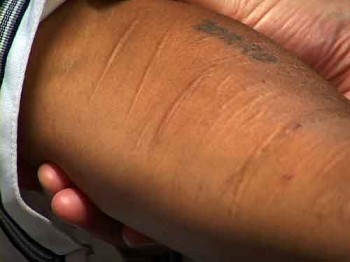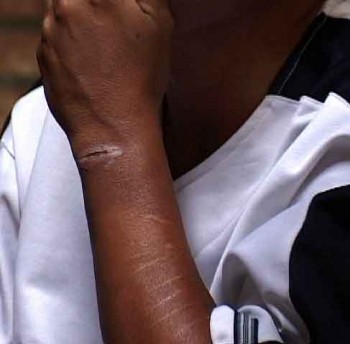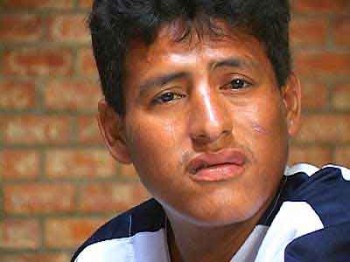A dozen boys swarmed around Gary Ferrari in front of the Sheraton Hotel in Lima. At least it seemed like a dozen—they’d appeared out of nowhere and were gone in just a few seconds. In that cyclone of baby-faces and a hundred probing fingers, they got his wallet and the gold chain from his neck.
Pickpockets in Lima
“We call them pirañas,” said Dora Pinedo, concierge at the Sheraton. “They are everywhere.”
“I don’t know how they got my chain,” said Gary, rubbing the red welt on his neck. “It was under my shirt.” He didn’t realize that the boys had learned to recognize the telltale ridge of fabric that covers any chain worth stealing.
“They’re usually seven-, eight-, nine-year-old boys,” Dora told us, “and they mob their victim in groups of six to ten. There is nothing one can do with so many little hands all over.”
We interviewed Petter Infante, 28, and Wilmer Sulca, 17, both grown-up pirañas. We found them at Lima’s University Park, where a comedy presentation was taking place in an entertainment pit, rather like a small amphitheater. Hundreds of people surrounded the pit, transfixed. Others loitered around the audience, more sat on cement benches, and many were asleep in the grass. Petter and Wilmer looked at us skeptically but agreed to talk to us after Gori, our interpreter, paid off a policeman patrolling the park.

“But not here,” Wilmer said.
“Anywhere you want,” said Bob. Right, let’s enter their lair, and let’s take our fancy equipment in with us. The five of us piled into a taxi and Wilmer instructed the driver in staccato Spanish. Where were they taking us? I looked at Gori for assurance but our fine-boned archeology-student interpreter was not a bodyguard.
Wilmer led us into a garage-like cantina, dark, deserted, music blaring, disco lights flashing. The boys ordered huge bottles of Cristal beer. Bob wired Petter with a microphone and I set up our video camera, hyper-conscious of our vulnerability—read that: scared. My eyes were glued to Petter’s left arm, a mass of parallel scars, layer upon layer of them. A cut on his wrist was gaping open, infected. I used the gash to focus the camera.

“The first thing I ever stole was a chicken,” Petter said. “I was twelve years old, alone, and hungry. I had small brothers to take care of.” Petter’s expressive face told a many-chaptered tale of violence: his snaggle teeth were edged with gold, his cheeks crosshatched with scars.
“I’m best at stealing watches. I just grab it off someone walking, then run. I’m a very fast runner. The victim could never catch me. We call this arreba tar. It means run-steal.”
He stood to demonstrate his expertise. Bob stood to be victim. “You can see there’s nothing in his front pocket, it’s flat,” Petter said. Then he did a lightning fast dip and grab into Bob’s back pocket. The wallet flew upward with a grand flourish, like the follow-through of a tennis stroke.
“We’ll steal anything,” Wilmer said, “nothing in particular. It’s all easy. It’s like a game.” Wilmer then showed the same method from Bob’s front pocket, finishing with the same exuberant flourish. “Cocagado—I’m already gone. By the time the victim realizes, we’re cocagado.”
The knife scars on Petter’s arm are like stripes on an officer’s shoulders: you have to respect him. You see he’s tough and dangerous. He started cutting himself a few years ago.
“If the police catch you, you cut yourself and they release you. They don’t want you if you’re cut and bleeding.”
“I’m on the street nine years and I never cut myself,” Wilmer said. “I don’t like to do that. We don’t have the same philosophy, Petter and I. He likes to cut himself, I do not. We think differently.”
(A police officer explained that an injured arrestee must be taken to a hospital, which requires hours of paperwork. If an arresting officer is near the end of his shift, he may not want to pursue such lengthy formalities.)
Petter and Wilmer, pickpockets in Lima, are opportunists, pirañas grown into hardened thieves. Petter thinks nothing of threatening his victims with a knife. I don’t know if he ever has or would use it. The boys’ main operative is speed.

“We wait at the bus stops and look for someone with a good watch, or something else to take. We wait until the bus doors are ready to close then grab it and run. And sometimes we grab things through the open windows of the bus. We reach inside and grab cellphones, watches, glasses, purses, anything.”
Opportunists look for sure bets, for temptations, for the fat wallet protruding from a back pocket “like a gift,” as a pickpocket in Prague told me. “We call it …˜the other man’s pocket,'” a Russian thief revealed; “the sucker pocket,” said another. “Tourists make it too easy,” complained a man in Prague whose family members were admitted thieves.
Excerpt from Travel Advisory: How to Avoid Thefts, Cons, and Street Scams
Chapter Five: Rip-Offs: Introducing… the Opportunist






